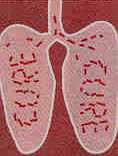Promising cure
 for the millions suffering from tuberculosis, especially in the Third World countries, the development of a new vaccine offers a glimmer of hope. Scientists at the Medical Research Council, uk, have reported success in preventing mice in laboratory tests from falling prey to the tuberculosis bacterium. This could be the first step towards replacing the currently available bcg vaccine to combat tuberculosis, according to Douglas Lowrie, leader of the research team.
for the millions suffering from tuberculosis, especially in the Third World countries, the development of a new vaccine offers a glimmer of hope. Scientists at the Medical Research Council, uk, have reported success in preventing mice in laboratory tests from falling prey to the tuberculosis bacterium. This could be the first step towards replacing the currently available bcg vaccine to combat tuberculosis, according to Douglas Lowrie, leader of the research team.
This new vaccine contains dna from Mycobacterium leprae, a close relative of the tuberculosis bacterium. The dna consists of a gene that creates a protein called hsp 65.The dna is supposed to work by attaching itself to special immune cells in the body called dendritic cells where it begins to produce hsp65. The nature of the dendritic cells are such that they take in proteins from invading micro-organisms and display fragments of them on their surfaces, readying other immune cells to fight the infection.
Lowrie contends that the hsp65 must have ended up on the surface of the dendritic cells and thus helped the mice to fight against not only m leprae, but also m tuberculosis.
